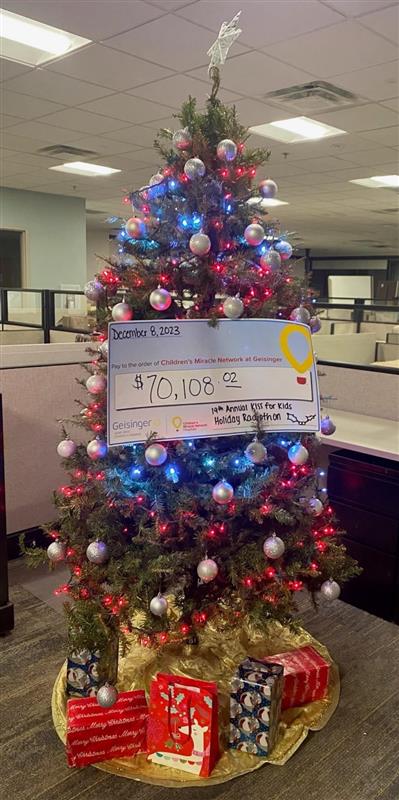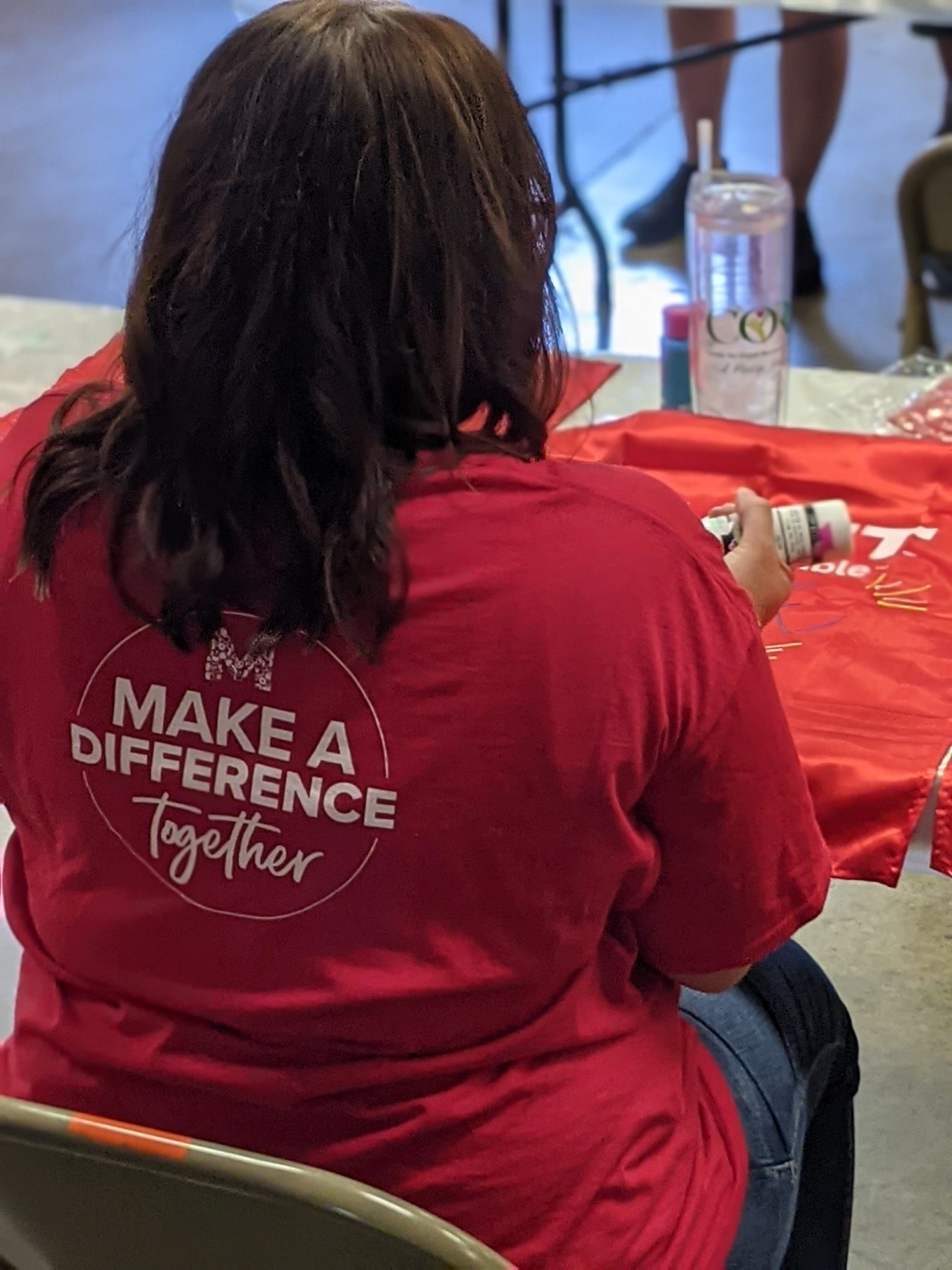2014 Miracle Kid Oskar Schmalhofer

Oskar Schmalhofer of Montoursville has a small programming error in his genetic makeup.
In the IT world a programming error results from bad code, causing small errors on websites or programs. In the genetic world a small programming error can lead to multiple problems in the development of the body and organs.
Oskar, 5, has a partial duplication of his 19th chromosome. The duplication makes Oskar extraordinarily unique – the only child recorded with the genetic difference in the world – but creates a medical puzzle for doctors.
“What we know about genetic conditions is if you have a programming error, it can lead to multiple medical issues down the road,” said Bonnie Salbert, D.O., pediatric geneticist. “Depending where that error is, it can affect different genes and different areas of the body.”
In Oskar’s case, the slight genetic deference has caused major problems with his heart and airway, stomach, esophagus, feet and hands.
“When we see a child or an adult that has multiple things going on that don’t seem to be connected, but at the same time are causing significant issues, we wonder if it is one big programming error,” Dr. Salbert said. “His extra piece of chromosome has specific genes that have led to a lot of different complications. Oskar has had a lot of specialists very early.”
It was during a prenatal visit that doctors at Geisinger-Lycoming Physician Office discovered Patsy and John Schmalhofer’s unborn child may have heart issues, though they were uncertain as to the extent.
“When he was born on April 6, 2009, we were prepared to go to the Neonatal Intensive Care Unit, but he was fine and we were able to go home pretty much right away,” Patsy said. “It was two weeks later, when we went for a follow-up appointment, that cardiology told us we needed to get Oskar to the hospital right away.”
The cardiology team found that Oskar had coarctation of the aorta, which is a narrowing in part of the aorta, the main artery on the left side of the heart. The defect was sending Oskar into congested heart failure.
“The condition causes high blood pressure and can put patients at risk for stroke or aneurisms and, over time, can cause a heart attack. The treatment for the coarctation is surgery and catheterization,” said David Connuck, MD, Pediatric Cardiologist at Geisinger Janet Weis Children’s Hospital. “We then have to continue to monitor the aorta and dilate it if we see it narrowing.”
Oskar was admitted to the Pediatric Intensive Care Unit at Geisinger Janet Weis Children’s Hospital and on April 29 underwent surgery to widen his aorta.
During the procedure, the cardiology team found a few more issues with Oskar’s heart — left ventricular dysfunction and left ventricular noncompaction cardiomyopathy, a condition where the heart muscles are spongy and non-compacted, consisting of a mesh of numerous muscle bands.
“It (noncompaction cardiomyopathy) is not something they can really fix. It is just something they have to watch,” Patsy said.
Oskar was in the PICU for about a month. In October doctors were concerned that Oskar wasn’t growing as he should. Additional testing showed the aorta was again narrowing. He was scheduled for another surgery to dilate the aorta.
“During the procedure they had difficulties with Oskar’s airway,” Patsy said holding back tears. “Oskar actually coded.”
The Janet Weis Children’s Hospital staff in the inpatient unit on the second floor (Children’s 2) responded quickly and revived Oskar, according to Patsy.
“Oskar had a lot of bleeding in his airway. The nurse and doctors continued to be with him until they figured out where he was bleeding,” Patsy said. “The nurses on Children’s 2 were just phenomenal that day. They got him where he needed to be.”
Oskar’s genetic difference also causes him to have a small airway and jaw. He was seen by Catherine Wubbel, MD, pediatric pulmonologist at Geisinger Janet Weis Children’s Hospital. After some testing, Dr. Wubbel determined that Oskar’s small airway was causing sleep apnea. He was sent home with oxygen to help with his breathing.
During a visit with Dr. Wubbel, the family was introduced to Mahmoud Sabri, MD, pediatric gastroenterologist . After a series of tests, Dr. Sabri diagnosed Oskar with acid reflux and recommended fundoplication surgery and a G-tube (or feeding tube) to help him receive adequate nourishment. Fundoplication is a surgical procedure designed to strengthen the valve between the esophagus and stomach to stop acid from backing up into the esophagus.
“The fundo was on Aug. 10, 2010,” Patsy said with tears welling up in her eyes. “During the procedure, he had so many issues with reflux that he coded once again. When they were trying to intubate him, which is an issue with his small jaw, and his throat closed up.”
Luckily, Edward Wood, MD, pediatric otolaryngologist, was in the room next door and was able to respond quickly, performing a tracheotomy to assist Oskar’s breathing.
“All the way, God has watched over Oskar and put us with the staff and the doctors Oskar has needed,” Patsy said, choking back tears. “The nurses said when an ENT can put the trach in, that’s a good thing.”
Oskar remained in the PICU for another 16 days.
“I stayed in the room with him,” Patsy said. “I knew he was in good hands but it gave me an opportunity to learn how to take care of him. The staff was wonderful when he got the trach. They knew that was not something we were expecting and that it was overwhelming for us.”
Although Oskar came home with the trach and the G-tube, at 18 months old, he had no problem getting back into his routine.
“He adjusted quicker than John and I did,” Patsy said. “He was back playing and scooting. The trach inhibited his verbal skills for a while, so we worked on sign language and speech and focused on being healthy.”
Oskars’ grandparents David and Debbie Lomison were amazed by Oskar’s resilience and ability to adapt.
“When he was learning sign language he was phenomenal,” Debbie said. “He knew so many signs and he was teaching David.”
“I didn’t pick it up very well,” David acknowledged.
The fundoplication alleviated Oskar’s acid reflux and after only 6 months, the G-tube was removed. Oskar went right back to eating. The trach, however, remained. Since it provided a safe alternative to intubation, Dr. Wood worked with Oskar’s specialists and the Schmalhofers to determine what tests and procedures could be scheduled immediately.
“We talked about his tonsils and adnoids and they wanted to remove those prior to getting the trach out,” John said. “With all of his airway issues, Dr. Wood wanted to be sure that this would be a much easier process for Oskar.”
In March 2012 Dr. Wood removed Oskar’s tonsils and adenoids.
“He had his tonsils removed and 80 percent of his adenoids,” Patsy said. “They had trouble getting them out because they were so big. They were causing his sleep apnea and some of his airway issues. After they came out, his ability to swallow also improved. That was our smoothest surgery to date.”
Along the way, Oskar was also seen by Janet Weis Children’s Hospital Pediatric Orthopaedic specialists for the stiffness in his hips and finger joints and his club foot.
“We stretched his foot a little bit and went through a casting program. We casted him like we do all club feet, when he was a couple months old, and he showed gradual improvement. However, 95 percent of the kids that undergo a casting program have to have their achilles tendon released,” said William Mirenda, MD, Chief of Pediatric Orthopedics at Geisinger Janet Weis Children’s Hospital. “We normally do that in clinic with a little bit of numbing medicine, but Oskar’s heart issues were significant enough that we couldn’t use that approach.”
Dr. Mirenda coordinated with the cardiology team to do the procedure to release his tendon during one of Oskar’s heart catheterizations, eliminating the need to anesthetize him yet again.
“He did great and has continued to do well,” Dr. Mirenda said. “His hips have developed nicely. His fingers are still a little bit tight, but they have improved as well. He is able to walk and is running around now.”
In May 2012, the trach was removed.
“It was nice to see everybody in the PICU,” Patsy said. “The staff there is fantastic. They take the time to get to know who you are and always say hello to Oskar. We stop by and visit when we are in the hospital. They take him on a little tour of the PICU and tell him which rooms he was in. It is very much a family atmosphere.
At the end of last year, cardiology found that Oskar would need to have his aorta dilated once more.
“He had an MRI that showed the aorta narrowing again and his left ventricle was enlarging as a result of that,” Patsy said.
The cardiology team outlined some options to help Oskar, making certain the family understood every scenario.
Oskar’s heart condition will never be fixed but the cardiology team is working to manage his heart until he is older and stronger for a possible heart transplant.
“There are some different options they laid out for us. They didn’t hestiate at any of our questions,” Patsy said. “Dr. P. (Anastasios Polimenakos, MD, cardiac, vascular and thoracic surgeon) said that they would do what they can now given his age and continue to monitor and keep him healthy.
“We know they are keeping track of him and that we can talk to them anytime. We left that meeting confident that they have Oskar’s best interest at heart. That is where God wants us to be at Janet Weis. We have peace that that’s who is going to take care of him.”
At home, Oskar gets no special treatment from his two older brothers Jakob, 13, and Zackary, 11.
“His brothers are very protective of him and they always have been very good with him. But just because he has issues, doesn’t mean they don’t fight with him or pick on him,” Patsy said.
Dr. Salbert had a wonderful opportunity to work with Jakob to help him with a school science fair project. The situation really gave her the opportunity to help the family understand Oskar’s genetic difference.
Jakob told Dr. Salbert he wanted to do a science project that would tell people about Oskar. He sent questions and Dr. Salbert provided answers to help with the project.
“He actually got an award at the science fair for his report,” Dr. Salbert said. “It was nice because I felt like I could really help this family. It is really kind of exciting for me because I do not always get that opportunity.”
Oskar’s outgoing personality, despite all of his setbacks, is what makes him such an amazing kid. The many specialists and staff members that have come in contact with him all have wonderful things to say.
“He has been through a lot,” said his pediatrician Sandra Beall, MD, of Geisinger-Lycoming. “The big thing with Oskar was he couldn’t grow because his body was working so hard to breathe and survive. It is great to see him running down my halls. The Schmalhofers are a wonderful family. That is one of the reasons he has done so well.”
Dr. Salbert couldn’t agree more.
“What makes Oskar a miracle is that he is doing so great,” she said. “I think what is so special about him is the way his family has rallied around him. The way, despite everything he had to overcome, he is just regular member of that family. He is just Oskar. He has so much personality.”
A personality that is able to shine thanks to the coordinated care of specialists at Geisinger Janet Weis Children’s Hospital and the specialized equipment and programs funded by Children’s Miracle Network at Geisinger that have had a huge impact on Oskar and his family.




